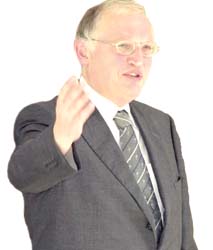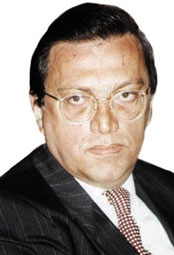21
February 2002
![]()
2. "Death Penalty", columnist Fikret Bila writes on the discussions over the death penalty and the reasons put forth by the sides.
3. "Unasked Questions", columnist Cuneyt Arcayurek writes on EU Commission for Enlargement, Gunther Verheugen's statements regarding Cyprus.
4. "Survey: 68 percent of Turkish people want membership to EU", 68 percent of Turkish public, who are unhopeful for the future, want Turkey to become a member of the EU as a solution to poverty and unemployment.
5. "Yilmaz hopes to overcome the difference of opinion within the government:Kurdish education issue may come to the agenda of MGK meeting", coalition junior partner Motherland Party (ANAP) leader Deputy Prime Minister Mesut Yilmaz says he hoped that they would be able to overcome the differences of opinion within the government, referring to the controversy with its coalition partner the Nationalist Movement Party (MHP) on the lifting of the death penalty.
6. "Iran and Turkey negotiate on Precautions against PKK", Turkey did not find the precautions taken by Iran against the PKK terrorist organization satisfactory. Although Iranian Deputy Foreign Minister Muhsin Eminzade said, “PKK does not exist in the relations between the two countries any more,” Ankara requested that a sudden inspection be made.
1. - AFP - "Turkey-EU relations clouded by mysterious e-mail leaks":
ANKARA / by Florence Biedermann
E-mails sent by an EU envoy in Ankara that were intercepted by mysterious
hackers and published by a Turkish politician have cast a cloud over
often difficult EU-Turkish relations. Dogu Perincek, head of one of
the few parties that still claim allegiance to Maoism, earlier this
month accused the executive European Commission's representative in
the Turkish capital, Karen Fogg, of spying after obtaining hundreds
of e-mails she sent to Brussels and Turkish addresses.
Perincek, whose small Labor party is taking a marked anti-imperialist and anti-Western stand, published the messages in his party's weekly, Aydinlik, and made them available to Turkey's mainstream media.
But he did not reveal how he got hold of them. Having spied and damaged Turkish interests, Fogg should be declared persona non grata, he said.According to diplomatic sources in Brussels, Fogg could -- in the worst case -- be recalled to Brussels to underscore the commission's anger. Under international law, the EU delegation in Ankara enjoys full diplomatic status.
As Turkey prepared to host a joint meeting of the European Union and the Organisation of the Islamic Conference on cultural tolerance, an Islamic television network held a lengthy debate on the e-mails on February 8 but other media only commented after the Istanbul conference ended. One of the messages, published in the Milliyet newspaper, claimed that the EU would consider financial help for the publication of a newspaper in the language of Turkey's restive Kurdish minority.
Other messages concerned day-to-day developments in Turkey such as political reforms, EU-Turkish relations, and matters relating to the divided island of Cyprus. Questioned on the final day of the OIC-EU meeting whether Fogg would be expelled, Turkish Foreign Minister Ismail Cem branded the affair as a crime and shameful, and warned of legal action.
Turkey, whose politics is in many ways still shrouded in Byzantine ways, was rife with conspiracy theories about who may have passed on the e-mails to Perincek -- the MIT secret service, or the army, both of which have denied any involvement, or anti-European circles hoping on undermining Ankara's bid to join the European Union?
Fogg, in a meeting with Prime Minister Bulent Ecevit only two weeks before news of the e-mail leaks broke, criticized as insufficient a Turkish reform package designed to bring the country closer to EU standards. The democracy reforms were finally adopted by the Turkish parliament. Jumping on the conspiracy bandwagon. Deputy Prime Minister Devlet Bahceli of the far-right Nationalist Action party saw a "provocation by some foreign circles that do not want Turkey in the European Union" but did not give names.
The 15-nation EU agreed in December 1999 after years of
stonewalling to accept a Turkish application for membership but talks
are not expected to be held for years. The European Commission, angered
to see the confidential e-mails leaked to the Turkish press, told Turkey
on Tuesday to improve security at its diplomatic mission in Ankara.
"This incident is turning into a farce," said an editorial
in the English-language Turkish Daily News. "But the strange thing
is that authorities are looking on without doing anything. If Turkey
wants to keep modernizing it must show goodwill as far as the EU is
concerned." ![]()
2. - Milliyet - "Death Penalty":
Columnist Fikret Bila writes on the discussions over
the death penalty and the reasons put forth by the sides. 
Turkey is discussing the abolition of death penalty in line with
the program presented to the European Union. In fact, the discussions
are not over death penalty itself, but the sentence passed on terrorist
chieftain Ocalan. If Ocalan had not received capital punishment, discussions
would not have been as heated as it is today. Turkey did not execute
death penalty since 1984.
There seems to be a tendency in society towards the abolition of the capital punishment. However, Ocalan and his terrorist attacks hinder Turkey to take it completely out of the legal system. We can also say that the determining factors in the policies of the political parties are Ocalan and the PKK terrorist organization's activities. There is no party defending the death penalty in the process of becoming a member to the EU.
The parties opposing the abolition of the penalty are not against the canceling of the sentence but rather the sentence passed on Ocalan. They are afraid of being a party annulling the punishment of Ocalan. It goes without mention that the Nationalist Action Party (MHP) has a special place in these discussions due to its ideology and grassroots. It is not realistic to expect the MHP, which owes its success in 1999 to its opposition to the PKK, to support the canceling of the death penalty which will benefit Ocalan.
True Path Party (DYP) follows a similar line as the main
opposition party. It is difficult for parties of the left and the right
to approve an arrangement which would lead to the lifting of Ocalan's
sentence. That is why a search for a middle path should be received
with understanding. It is not realistic to expect a decision for the
abolition of the sentence passed on Ocalan in a country which has suffered
the loss of 30,000 lives in 20 years due to his actions. While waiting
for Turkey to complete her homework, Europe should take these facts
into consideration. However, it would not be correct to expect such
an understanding.![]()
3. - Cumhuriyet - "Unasked Questions":
Columnist Cuneyt Arcayurek writes on EU Commission
for Enlargement, Gunther Verheugen's statements regarding Cyprus
During his visit to Ankara, EU Commissioner for Enlargement Gunther
Verheugen has delved in another matter of crucial importance to Turkey,
Cyprus, in addition of the abolition of death penalty, education mother
tongue. He stated that the EU would admit Greek Cypriot Administration
into the Union if there is a solution or not.
The Eu Commissioner believes that the Greek Cypriot administration represents the entire island. Whatever we say or believe have no importance regarding the issue. Both the UN and the EU believe that the Greek Cypriot administration means Cyprus Republic. The Commissioner came, sowed the seeds of dispute and left. TRNC President Rauf Denktas who is continuing a dialogue with the Greek Cypriot administration leader is fuming.
Just as a compromise was being reached on every issue, the words of Verheugen is creating dispute. Why should the Greek Cypriots which have the EU membership in their pocket agree to a compromise or a partnership? According to an argument, Greek Cypriots are continuing the dialogue just to show that they are not the intransigent party. The EU also began to ask for the abolition of death penalty.
As it kept silent when the amendment to the constitution
abolishing capital punishment excluding crimes of terror and crimes
against the stated was passed, why did the EU began to impose the abolition
of the death penalty unconditionally? Were the reasons for such a change
was asked of the EU? Is this change closely concerned with the politicization
efforts of the PKK or their aim to support its politicization? ![]()
4. - Turkish Daily News - "Survey: 68 percent of Turkish people want membership to EU":
ISTANBUL / by Guzin Yildizcan 
68 percent of Turkish public, who are unhopeful for the future,
want Turkey to become a member of the EU as a solution to poverty and
unemployment. But 60 percent give importance to the Turkish identity,
and national and local values
Results of public opinion polls conducted in Turkey and the EU countries have revealed that there are important social, economic and cultural differences between Turkish people and Europeans.
Some 68 percent of the Turkish public want Turkey to become an EU member, while 60 percent see themselves as only Turk. While Turks mostly give importance to national and local values, Europeans have become adapted to an international identity. The research "Turkey-EU Agenda 2002," which was carried out by the Turkish-European Foundation with the support of Taylor Nelson Sofres-PIAR Research Institute, and surveyed 1,886 people in 17 cities, was publicly announced yesterday.
The results of Eurobarometer research conducted in European countries twice a year, and the results of the Brussels-based research, which is conducted in EU candidate countries, were compared in Agenda 2002. Comparisons reveal that while Turkish people presented an unhopeful picture about the current situation and the future of themselves and Turkey, the peoples of EU member countries are pleased with their economic and social life and don't worry about the future.
Hasan Tanla, who presented Agenda 2002, stated that according to the research, the Turkish public wanted to be a member of the EU as a solution to economic problems, unemployment and poverty. Tanla evaluated the results of the research as follows:
"While Turkish people have a basic expectation which will meet their economic demand and safety, Europeans consider social sharing, an increase of cultural richness, the protection of environment and prevention of crimes and threats with an international effort. While Turkish people perceives EU membership as "to be administrated by Europe," Europeans don't feel at ease because of this issue.
According to the research, 60 percent of the Turkish public
see themselves as only Turk. The rate of those who see themselves as
Turk and European is 20 percent. Some 8 percent of Turkish people say,
"I am a European." 38 percent of peoples of EU member countries
define themselves with the identity of their own nation. 68 percent
of Turkish people say "yes" to EU membership, 19 percent say
"no." 65 percent people from other EU candidate countries
want EU membership, 18 percent don't. ![]()
5. - Turkish Daily News - "Yilmaz hopes to overcome
the difference of opinion within the government: Kurdish education issue
may come to the agenda of MGK meeting": 
Coalition junior partner Motherland Party (ANAP) leader Deputy Prime
Minister Mesut Yilmaz says he hoped that they would be able to overcome
the differences of opinion within the government, referring to the controversy
with its coalition partner the Nationalist Movement Party (MHP) on the
lifting of the death penalty.
In a live interview with NTV, Yilmaz responded to questions on the death penalty, education in the Kurdish language and Turkey's EU membership process. Yilmaz noted that they had focused on fulfilling Turkey's pledges to the EU, when asked if they would bring the death penalty for terrorist organization Kurdistan Worker's Party (PKK) leader Abdullah Ocalan to the agenda.
Evaluating the opinions that a constitutional amendment would be required to lift the death penalty, Yilmaz said that the government would appeal to the Council of State if there was a need to get a legal opinion. When recalling the statement of the MHP leader Devlet Bahceli saying that the government would not be able to lift death penalty without the support of the MHP, Yilmaz emphasized that their attitude on this issue was clear, refusing to talk on the statements of others, which he did not know to be true.
Stressing that the MHP had said that it would respect to Parliament will to lift the death penalty, Yilmaz said that it was a very constructive approach. Responding to a question of the European Union Convention, Yilmaz noted that the major threat for the EU was ethnic nationalism and religious terrorism for the time being, pointing out that Turkey had a word to say on these two issues at the Convention since it was the country that would contribute most to the union on the issues.
He stressed that 2002 was the most critical year for Turkey in terms of its relations with the EU, and said that Turkey would take another step next year and start full membership negotiations. Yilmaz said that the government would present a package including the law amendments required for the harmonization with the EU legislation in the scope of its short-term targets, to Parliament by mid-March.
Kurdish education may come to the agenda of MGK meeting once more
When asked if the Turkish military had expressed any opinion about the education in the Kurdish language, Yilmaz said that the army commanders had expressed their opinions during the all-powerful National Security Board (MGK) meetings, and added that the issue might once more come to the agenda of the MGK meeting scheduled for Feb. 27. Yilmaz does not believe the opinion that Turkey would be divided if education in the Kurdish language was allowed.
Recalling that Turkey had lifted the law banning Kurdish in 1991, Yilmaz stated that nobody had asked Turkey to make Kurdish the official language to be taught in State schools. According to him, what was asked from Turkey is to allow people who are willing to learn their native languages in places other than State schools. He stressed that banning education in Kurdish language, which had no function, was contribution to the propaganda made by the PKK.
"If we allow it, I believe that a few people will benefit from this freedom," he said. He added that Turkey needed some courage and self-confidence to take this step.
No election before autumn 2003
Yilmaz noted that Turkey would not hold a general election
before autumn 2003 at the earliest. "I don't see any chance of
elections before autumn 2003," Yilmaz said. He stated that general
elections were usually held in the autumn in Turkey, and the polls in
spring 1999 had been unusual. ![]()
6. - Aksam - "Iran and Turkey negotiate on Precautions against PKK":
Turkey did not find the precautions taken by Iran against the PKK terrorist organization satisfactory. Although Iranian Deputy Foreign Minister Muhsin Eminzade said, “PKK does not exist in the relations between the two countries any more,” Ankara requested that a sudden inspection be made. During the meetings held with Eminzade, who came to Turkey as the guest of Turkish Foreign Ministry Undersecretary Ugur Ziyal, it was accepted that the cooperation of security between the two countries would be increased.
Ankara, which had previously suggested that simultaneous
operations be made, this time brought “sudden inspection”
issue on the agenda. The sudden inspection envisages that the soldiers
from two countries are enabled to inspect a region, which had been determined
before, unexpectedly. The Iranian delegation requested that works be
conducted on this proposal. ![]()